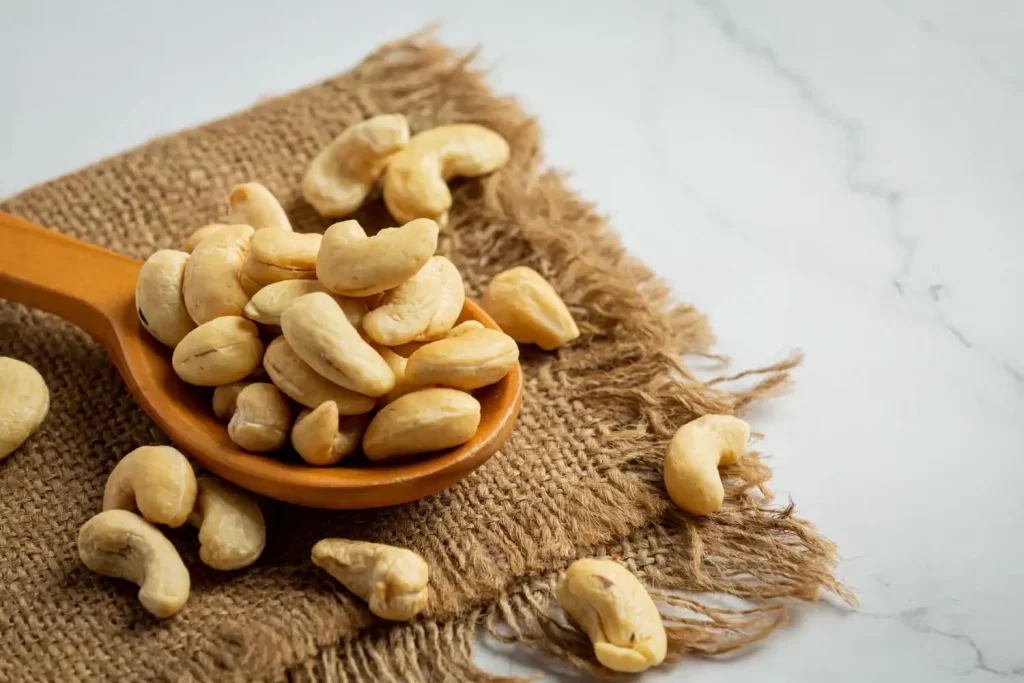Couples planning for pregnancy should pay attention to their diet as the nutrients entering the body can impact fertility and the success of the pregnancy program. Cashew nuts contain various nutrients such as vitamin E, protein, folate, fiber, healthy fats, and magnesium that are beneficial for reproductive health and support the pregnancy program.
What are the benefits of cashew nuts for the pregnancy program? Let’s read this article for more details!
Nutritional Content of Cashew Nuts
Based on the Composition of Indonesian Food and the Food Data Central of the U.S. Department of Agriculture, the nutritional content of 100 grams of raw cashew nuts is as follows:
- Water: 4.6 grams
- Energy: 616 kcal
- Protein: 16.3 grams
- Fat: 48.4 grams
- Carbohydrates: 28.7 grams
- Fiber: 0.9 grams
- Calcium: 26 grams
- Phosphorus: 521 mg
- Iron: 3.8 mg
- Sodium: 26 mg
- Potassium: 692 mg
- Copper: 4.7 mg
- Zinc: 4.1 mg
- Beta-carotene: 5 mcg
- Vitamin B1: 0.64 mg
- Vitamin B2: 0.03 mg
- Magnesium: 292 mg
- Manganese: 1.66 mg
- Selenium: 20.7 mcg
- Vitamin B3: 1.06 mg
- Vitamin B5: 0.864 mg
- Vitamin B6: 417 mg
- Vitamin B9: 25 mcg
- Vitamin E: 0.9 mg
- Vitamin K: 34.1 mcg
Several of these nutrients are beneficial for supporting the pregnancy program.
Benefits of Cashew Nuts for the Pregnancy Program
Cashew nuts are believed to be beneficial for the pregnancy program due to their nutritional content. Here are various benefits of cashew nuts for the pregnancy program:
1. Vitamin E
Vitamin E is important for the pregnancy program as it is believed to enhance fertility in both men and women. Vitamin E plays a role as an antioxidant, protecting sperm and egg cells from free radicals.
2. Protein
The formation of cells and body tissues requires protein. Sufficient protein intake assists in the formation of reproductive cells and maintains the function of reproductive hormones.
3. Healthy Fats
Cashew nuts contain healthy fats, namely unsaturated fatty acids which are beneficial for overall body health, including reproductive functions. Fatty acids also play a role in maintaining the regulation of hormones that influence fertility.
4. Folate (Vitamin B9)
During pregnancy, the daily requirement for maternal folic acid is 400 to 600 micrograms. Folic acid plays a role in maintaining the health of a woman’s ovaries. The ovaries are reproductive organs that produce reproductive hormones and release eggs.
A deficiency in folic acid can also lead to anemia. If anemia occurs during pregnancy, it can pose risks to both the mother and the fetus.
5. Iron
Iron is a crucial mineral for the pregnancy program. Iron deficiency in women can reduce the quality of eggs. Iron also plays a role in the formation of red blood cells. Insufficient iron can lead to anemia, which not only has negative effects on the mother but also on the fetus. Therefore, iron intake should be monitored during the pregnancy program.
6. Zinc
Zinc plays a role in the fertility for both men and women.
Zinc deficiency in men can lead to poor sperm quality, while in women, a lack of zinc can hinder the development of eggs.
Tips for Consuming Cashew Nuts for the Pregnancy Program
After understanding the nutritional content and benefits of cashew nuts for the pregnancy program, it’s essential to consume them in a healthy way. Despite their numerous benefits, moderation is key. Here are some tips for consuming cashew nuts during the pregnancy program:
1. Consume in Moderation
The daily recommended consumption of cashew nuts is 25–30 grams to avoid overeating and ensure a balanced diet.
2. Prefer Roasted over Fried
Choose roasted cashew nuts over fried ones to avoid unhealthy fats from the frying process.
3. Avoid Adding Sweeteners and Flavor Enhancers
Cashew nuts already contain natural sugars and sodium. Adding sweeteners may increase sugar content, leading to potential health issues.
4. Combine with Other Foods
Enhance nutritional intake by combining cashew nuts with other foods, such as in salads.
5. Beware and Aware for Allergies
Cashew nuts can cause allergies. Ensure you are not allergic before consuming them or their processed products.
Arummi’s Recommendation: Delicious and Nutritious Cashew Milk
To diversify your cashew nut consumption, consider drinking cashew milk. Arummi innovatively processes cashew nuts into milk. Enjoy the nutritional benefits of incorporating Arummi products into your daily diet. You can find Arummi products in local marketplaces or supermarkets!









































